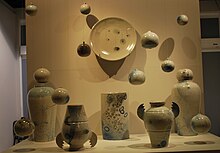Nunik Sauret

Nunik Sauret (born May 12, 1951) is a Mexican printmaker.
Born in Mexico City, Sauret studied at the Escuela Nacional de Pintura, Escultura y Grabado "La Esmeralda" in her native city. Sauret was trained in the techniques of Japanese printmaking and graphics under prominent teachers: Kobayashi Keisei, Tatsuma Watanabe, and Kuniko Satake.[1] In 1976 she became a member of the Taller de Grabado del Molino de Santo Domingo, an engraving workshop that was founded in the oldest flour mill in North America.[2] She has created drawings and paintings, but is known mostly for her work as a printmaker; techniques which she has used include etching, drypoint, aquatint, mezzotint, and engraving. She has also taught, her pupils including Eva Laura Moraga.[3] Sauret is a feminist artist who has shown work with the Polvo de Gallina Negra group.[4] In the early 1970s, she founded Colectivo Bio-Arte Bio-Arte along with other feminist artists, which was established to portray the biological transformation of women visually.[5] She has shown her work widely both in Mexico and elsewhere, in solo and group shows. Sauret has been featured in more than 100 individual exhibitions including the Galería de Chapultepec (1969), Galería de Letras in Cali, Colombia (1976), Galería Ponce in México (1977), Galería de Arte Mexicano en México (1981), Matisse Gallery in Monterrey (1985), Museum of Contemporary Art in Morelia (1988), Museo de la Estampa in INBA México, (1990).[6]
References
[edit]- ^ "Nunik Sauret". Casa Gama. Retrieved 2020-11-18.
- ^ "Cuadernos del Cenidiap". www.proceso.com.mx (in Spanish). Retrieved 2020-11-18.
- ^ Jules Heller; Nancy G. Heller (19 December 2013). North American Women Artists of the Twentieth Century: A Biographical Dictionary. Routledge. ISBN 978-1-135-63882-5.
- ^ María Claudia André (2005). Entre mujeres: colaboraciones, infuencias e intertextualidades en la literatura y el arte latinoamericanos. RIL Editores. pp. 96–. ISBN 978-956-284-414-7.
- ^ Aceves Sepúlveda, Gabriela (2019). Women Made Visible: Feminist Art and Media in Post-1968 Mexico City. University of Nebraska Press. ISBN 9781496213839.
- ^ "Arte en el TEC. "Transparencia" de Nunik Sauret". arteyculturaaracelirodriguez.weebly.com. Retrieved 2020-11-18.
- 1951 births
- Living people
- Women printmakers
- Mexican printmakers
- 20th-century printmakers
- 20th-century Mexican artists
- 20th-century Mexican women artists
- 21st-century printmakers
- 21st-century Mexican artists
- 21st-century Mexican women artists
- Mexican feminists
- Feminist artists
- Artists from Mexico City
- Escuela Nacional de Pintura, Escultura y Grabado "La Esmeralda" alumni
- Mexican women graphic designers
- Mexican artist stubs
